|
|
|
Sort Order |
|
|
|
Items / Page
|
|
|
|
|
|
|
| Srl | Item |
| 1 |
ID:
113379
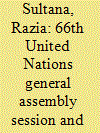

|
|
|
|
|
| Publication |
2011.
|
| Summary/Abstract |
Since its inception in 1945, the United Nations (UN) has been playing a pivotal role in restoring peace and maintaining security by taking several measures. One of the regular UN activities is to arrange the United Nations General Assembly (UNGA) intending to gather all the Heads of States and Governments to discuss multiple challenging issues faced by the member states nationally and globally. As the continuation of the UN action, the 66th UNGA held in September 2011 came up with several pertinent issues like climate change, global recession, food crisis, nuclear safety and terrorism. Bangladesh's Prime Minister Sheikh Hasina also attended the 66th UNGA and proposed a six-point multi-dimensional peace model addressing a number of national and global vulnerabilities including poverty and hunger, inequality, climate change and terrorism. It is in this context that the paper tries to focus on the issues discussed in the 66th UNGA and give an assessment regarding the steps taken by the assembly considering its existing limitations. Concurrently, the paper takes an attempt to analyse the role of Bangladesh as a developing country in the 66th UNGA session. The paper argues that through arranging UNGA for more than 60 years, the UN still tries to provide a unique venue for the member countries to discuss complex national and global issues and solve international disputes. More importantly, it is a common platform for small countries like Bangladesh to raise their voice, place their demands and to work together against the common global challenges.
|
|
|
|
|
|
|
|
|
|
|
|
|
|
|
|
| 2 |
ID:
155069
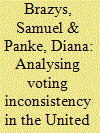

|
|
|
|
|
| Summary/Abstract |
In many international institutions, contested norms pass via voting. Although votes express national positions, dynamic vote shifts are a widespread phenomenon. Why do states sometimes change their voting stances concerning re-occurring international rules and norms? To explain observed variation, this analysis theorises the role of domestic and external windows of opportunity as well as the role of lobbying in the United Nations General Assembly. It shows that changes in government composition and changes in the text of re-occurring international rules and norms matter. Yet, whilst resourceful actors more likely change their voting stance after having successfully negotiated text changes, less powerful states are more likely to shift voting stances in response to third party lobbying.
|
|
|
|
|
|
|
|
|
|
|
|
|
|
|
|
| 3 |
ID:
152912
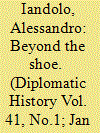

|
|
|
|
|
| Summary/Abstract |
History tends to remember Soviet participation at the Fifteenth Session of the United Nations General Assembly (UN GA, September 1960–April 1961) because of Nikita Khrushchev’s shoe. On October 13, 1960, the Soviet leader allegedly banged his shoe against his desk in the General Assembly hall to protest a speech he did not like.1 The incident is among the most well known in the history of the Cold War. However, despite the interest it has generated, Khrushchev’s conduct was the least important aspect of Soviet relations with the UN in 1960–61. This article reassesses Soviet participation at the Fifteenth Session of the GA in light of its medium- and long-term consequences for UN structure, practices, and vision. It also brings the issue of Moscow’s relations with UN members from the Third World, until now overlooked in the existing literature, into the story of this UN session.
|
|
|
|
|
|
|
|
|
|
|
|
|
|
|
|
| 4 |
ID:
122109
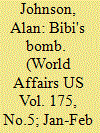

|
|
|
|
|
| Publication |
2013.
|
| Summary/Abstract |
Using only a red felt-tip pen and a cartoon that seemed straight out of Danger Mouse or Wacky Races, Israeli Prime Minister Benjamin Netanyahu stood on the podium of the United Nations General Assembly and drew Israel's red line in the face of the grave strategic threat facing his country. If Iran enriched enough uranium to twenty percent or higher, making it too difficult to prevent a breakout to the bomb, Israel would strike. Netanyahu estimated that point would be reached, if diplomacy and sanctions failed, in the spring or summer of 2013.
|
|
|
|
|
|
|
|
|
|
|
|
|
|
|
|
| 5 |
ID:
156548
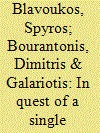

|
|
|
|
|
| Summary/Abstract |
In May 2011, the United Nations General Assembly (UNGA) passed Resolution 65/276 that enhances the European Union (EU) institutional mode of representation in the UNGA and other multilateral fora operating under its auspices. This followed an earlier, failed attempt that caused much embarrassment and political turmoil in the EU. The article examines the politics of this resolution, tracing its background logic, its origins and the political interactions in the UN that eventually led to its almost consensual embracement. It accounts for the failure in the first stage of the negotiations and how the EU responded to it, adjusting its bargaining strategy accordingly. This case study contributes to the better understanding of the links between intra-EU coherence and EU effectiveness as an international actor. We posit that there is one additional dimension of EU coherence not fully captured in the relevant literature. We distinguish between genuine coherence and generated coherence. The former entails homogeneity, or at least a significant degree of a priori convergence among EU member-states. The latter refers to EU positions that have emerged after hard and protracted intra-EU negotiations. The two types differ in the degree of flexibility bestowed on the EU in international negotiations.
|
|
|
|
|
|
|
|
|
|
|
|
|
|
|
|
| 6 |
ID:
152333
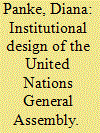

|
|
|
|
|
| Summary/Abstract |
Most international organizations are based on the principle of equality of states. Their institutional design grants all member states the same formal rights. Although formally equal, states differ immensely concerning their power capacities and size. Can institutional designs of international organizations mitigate real-world power- and size-related differences between member states, and if so, to which extent? To provide an answer, this article focuses on the United Nations General Assembly, which combines an equalizing institutional design with a large very heterogeneous membership. It shows that the strength of the equalizing effect varies across stages of the policy cycle. It is the weakest in the negotiation stage and the strongest in the final decision-making stage, while institutional design of international organizations has a de facto equalizing effect of medium strength in the agenda setting stage. Thus, while power and capacity differences matter, larger powerful states are not systematically better off throughout the entire policy cycle.
|
|
|
|
|
|
|
|
|
|
|
|
|
|
|
|
| 7 |
ID:
139529


|
|
|
|
|
| Summary/Abstract |
This study examines the effect of domestic political change on United Nations General Assembly (UNGA) voting. We argue that foreign policy change is most likely when a new leader—one who relies on different societal groups for support than her predecessor—comes to power. We then examine the extent that domestic institutional context—in particular, democracy—shapes this process. We test our hypotheses using a new measure of UNGA voting patterns and new data on changes in leaders' supporting coalitions. We find that change in the societal support base of leaders leads to change in UN voting, especially in nondemocracies. This study lends credence to the perspective that foreign policy, like domestic policy, can vary with the particular interests that leaders represent; it encourages scholars to focus less on leadership change per se and more on changes in the societal groups to which leaders are most accountable. This study also suggests that democratic institutions inspire policy consistency not only in areas governed by treaties and international law, but also in areas of foreign policy that are easier to alter in the short term.
|
|
|
|
|
|
|
|
|
|
|
|
|
|
|
|
| 8 |
ID:
171832
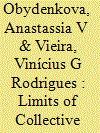

|
|
|
|
|
| Summary/Abstract |
Which limitations does the hegemon face when exerting financial statecraft through multilateral institutions? Recent studies indicate that intergovernmental organizations (IGOs) that are tools of collective financial statecraft sponsored by the United States, like the World Bank and the International Monetary Fund, lead developing states to align with Washington in the United Nations (UN). The same effect is verified in the case of US bilateral aid. Little, however, has been discussed about the effect of American-sponsored regional development banks (RDBs) in the same context. RDBs are IGOs with unique characteristics as each of them covers a region of the world and relies on resources from developed sponsors and developing borrowing members alike. In this article we aim to fill this gap in the debates on economic and financial statecraft by demonstrating through tobit models that the higher the material capabilities of a borrowing state that takes loans, the less likely it is to align with the United States at the UN General Assembly (UNGA). Membership of all RDBs but the European Bank for Reconstruction and Development (EBRD) yields the same effect. Results indicate the need to develop further research on RDBs to assess whether they create incentives for challenging the hegemon.
|
|
|
|
|
|
|
|
|
|
|
|
|
|
|
|
| 9 |
ID:
123174
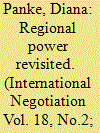

|
|
|
|
|
| Publication |
2013.
|
| Summary/Abstract |
Abstract The United Nations General Assembly is the International Organization (IO) with the broadest worldwide membership. While regional organizations are not members themselves, they can and often do become active through their own member states. This article addresses two questions: Do regional organizations differ in their ability to speak with one voice in IOs and, if so, why? Are some regional organizations more successful than others and, if so, why? Based on liberal theory and a mixed-methods approach, the research suggests, firstly, that regional organizations are in a better position to engage in collective action in IOs if they can develop group positions for a broad range of items. This is easier the greater the capacities and the stronger the incentives of the member states, the smaller the number of actors participating in regional organizations' coordination meetings, and the more homogenous groups are. Secondly, regional organizations are especially successful in IOs if they have common positions that their experienced and knowledgeable member states can push via argumentative strategies and if regional organizations can rely on the larger membership when it comes to playing two-level games in UNGA negotiations (tied-hands strategy) and when it comes to voting in IOs.
|
|
|
|
|
|
|
|
|
|
|
|
|
|
|
|
|
|
|
|
|